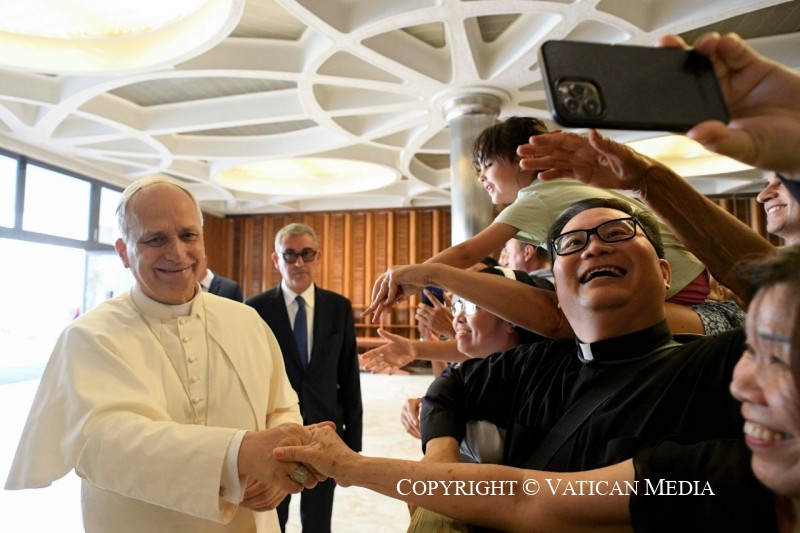Pope at audience: “Crying out is a profound act of humanity”
From St Peter's, in front of 35,000 faithful in the rain, Pope Leo reflected on Christ's cry on the cross: “Not despair, but sincerity, truth taken to the limit”. When it is not held back, it is “hope that does not give up”. It replaces words: “threshold of new light” even in the final hour.
Vatican City (AsiaNews) - ‘The Gospel gives our cry immense value, reminding us that it can be an invocation, a protest, a desire, a surrender.’ This morning, Pope Leo XIV, at the Wednesday general audience held in St Peter's Square despite the rain, spoke of the absence of silence at the ‘peak’ of Jesus' life, his death on the cross.
‘A cry is never useless if it comes from love. And it is never ignored if it is entrusted to God,’ he commented. It can become, even ‘when the hour of extreme trial comes,’ ‘the threshold of a new light.’
The Pope, in front of about 35,000 pilgrims from all over the world, continued the cycle of catechesis for the Jubilee, entitled ‘Jesus Christ our hope.’
The reflection shared after the readings in different languages is on the theme of death. ‘Jesus, crying out loudly, breathed his last’ (Mk 15:37). In the last moment of Christ's earthly life, it is important to note ‘a very precious detail’: he cries out.
‘That cry encompasses everything: pain, abandonment, faith, offering,’ he explained. This is followed by a heart-rending sense of abandonment, characterised by ‘silence,’ “absence” and ‘abyss.’
The cry is the ‘ultimate sign of a life that surrenders itself’ in the most painful moment, after a life lived ‘in intimate communion with the Father.’ ‘It is not a crisis of faith, but the last stage of a love that gives itself completely,’ explained Leo XIV. Jesus' cry is not despair, but sincerity, truth taken to the limit, trust that endures even when all is silent.‘ It is precisely at that moment that God makes himself ’visible.‘ ’In that tormented man [...] the greatest love is manifested. It is there that we can recognise a God who does not remain distant, but goes through our pain to the very end," added the Pope.
The centurion realises this: his is ‘the first profession of faith after Jesus' death.’ That last cry is not dissolved, disappeared, unrepeatable. ‘It touched a heart,’ said Prevost. And in turn, it comes from a “full” heart, which by crying out performs ‘a profound act of humanity.’
The risk is to think of the cry - which through the voice expresses ‘what we cannot say in words’ - as a necessity to be suppressed. The Gospel, on the other hand, attributing ‘immense value’ to it, frames it as ‘the extreme form of prayer.’ In crying out there is ‘a hope that does not give up,’ added Pope Leo XIV, continuing his reflection.
‘Jesus did not cry out against the Father, but to Him. Even in silence, he was convinced that the Father was there. And so he showed us that our hope can cry out, even when all seems lost.’
Crying out is, therefore, a ‘spiritual gesture.’ ‘Not to hurt, but to entrust ourselves. Not to shout at someone, but to open our hearts,’ he continued. A gesture to ‘not be afraid of,’ which can open the way to salvation. ‘The suffering voice of our humanity, united with the voice of Christ, can become a source of hope for us and for those around us,’ concluded the Bishop of Rome.







.png)










